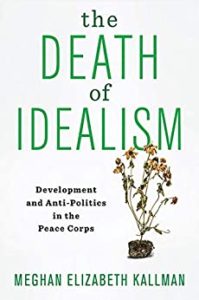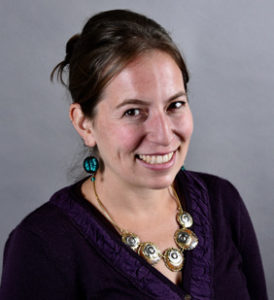The Death of Idealism and Anti-Politics in the Peace Corps
 The Death of Idealism
The Death of Idealism
Development and Anti-Politics in the Peace Corps
by Meghan Elizabeth Kallman
Columbia University Press
320 pages
$24.48 (Kindle), $110.00 (Hardback), $28.00 (paperback)
April 21, 2020
Meghan Elizabeth Kallman is an assistant professor at the School for Global Inclusion and Social Development at the University of Massachusetts Boston. She is coauthor of The Third Sector: Community Organizations, NGOs, and Nonprofits (2016) and an elected official in Pawtucket, Rhode Island.
A case study of the conflict between professionalization and idealism in the Peace Corps.
Shows how organizational practices affect people’s ideas and values in ways that have long lasting consequences for their lives and careers.
Based on interviews with over 140 current and returned Peace Corps volunteers, brings a new perspective on how people lose their idealism and why that matters.
Peace Corps volunteers seem to exemplify the desire to make the world a better place. Yet despite being one of history’s clearest cases of organized idealism, the Peace Corps has, in practice, ended up cultivating very different outcomes among its volunteers. By the time they return from the Peace Corps, volunteers exhibit surprising shifts in their political and professional consciousness. Rather than developing a systemic perspective on development and poverty, they tend instead to focus on individual behavior; they see professions as the only legitimate source of political and social power. They have lost their idealism, and their convictions and beliefs have been reshaped along the way.
The Death of Idealism uses the case of the Peace Corps to explain why and how participation in a bureaucratic organization changes people’s ideals and politics. Meghan Elizabeth Kallman offers an innovative institutional analysis of the role of idealism in development organizations. She details the combination of social forces and organizational pressures that depoliticizes Peace Corps volunteers, channels their idealism toward professionalization, and leads to cynicism or disengagement. Kallman sheds light on the structural reasons for the persistent failure of development organizations and the consequences for the people involved. Based on interviews with over 140 current and returned Peace Corps volunteers, field observations, and a large-scale survey, this deeply researched, theoretically rigorous book offers a novel perspective on how people lose their idealism, and why that matters.

A timely subject, which, in some ways, goes back to the beginning, and the relative priorities of the then-new “Three Goals”. The idealistic idea of making the world better, oftentimes comes into direct conflict with long-established host country cultural values, raising the early question of whether PCVs are there to change what people believe. John Turmbull
John Turnbull,
I think that is an excellent question. However, I have read Kallman’s book. I have no training or even knowledge of Sociology theory or terminology. I think, and I could be wrong, her conclusion is Peace Corps Volunteers should be more political and the PC bureaucracy socializes PCVS not to be political and thus PCVs lose their idealism.
Kallman used the NPCA network of affiliate groups to promote her questionnaire and invite RPCVs and PCVS to participate in her study. I have not seen the questionnaire nor does she publish it or even the title. I would really appreciate a review of her work by a RPCV who is knowledgeable about Sociology theory and terminology. I really did get lost. Although, there are errors in fact which I think are glaring, but may not be important.
I have now read “The Death of Idealism: Development and Anti-Politics in the Peace Corps” by Meghan Kallman. Below I offer my critique of her work.
With apologies to Mark Twain, the title “The Death of Idealism” is greatly exaggerated! When I began reading this book, I had every intension of critiquing it from a social science perspective. As a true social scientist would, I began by reading the methodology section. On page 255 I encountered this gem:
“This project relied on methods of grounded coding, which differs from other qualitative techniques in its emphasis on theory development, which occurs simultaneously with data collection . . . I thereby both generated the theory from the dataset and elaborated it in relation to the data itself.”
In plain English, the author is stating that she made up her theory as she went along! Actually, I wouldn’t have a problem with this if Kallman had labeled her work an exploratory case study. My suggested (honest) working title for her book: “A Critique of Development Organizations: The Peace Corps as a Case Study.”
After reading the above, my B.S. meter had been activated, so I just couldn’t take Kallman’s work as seriously. Her style is to begin each chapter with a quote from a Peace Corps volunteer (PCV), a former PCV (RPCV) or a Peace Corps staff member. She then explains how that quote supports her theory, and follows up with more quotes by Peace Corps related folks. Some quotes are over half a page long and her longest two chapters contain a total of 87 quotes. Chapter 4, Volunteers in the Field, is 46 pages with 39 quotes. Chapter 5, Home Again, is 50 pages containing 48 quotes. So, quoting Peace Corps related folks is a big part of her narrative.
My own hypothesis, based on Peace Corps related folks I’ve interacted with in the 46 years since the beginning of my own tour in El Salvador (1974-76), is that Peace Corps folks are such a diverse group intellectually and attitudinally that you can pretty much get a quote from one that will support any point of view you desire. And of course you can get a quote from another that will completely contradict what the first person said!
I’m not contending that Ms Kallman’s work is without merit, just that her data and analysis fall far short of demonstrating the death of idealism among Peace Corps volunteers and former volunteers. For example, she is not the first to suggest that Peace Corps training sometimes leaves much to be desired. However, my training for an agriculture program was pretty good, IMHO. Of course if you were able to interview all of my training cohort, I expect there would be mixed reviews! I agree with her assessment that Peace Corps places an overemphasis on monitoring and evaluation (something it shares with domestic and international government agencies at all levels). And this detracts from volunteers’ ability to focus on projects that will most benefit their host communities.
I am concerned that those government officials in the executive branch and Congress who wish to eliminate the Peace Corps will use Ms Kallman’s research to support their effort. But I do not believe it was the author’s intention to destroy the agency. I believe she intended her criticism to be constructive.
D.W. Jefferson
RPCV El Salvador, 1974-76 and Costa Rica 1976-77
Thank you D,W, Jefferson, for your excellent academic critique.
I have posted a critique of the book on Amazon. I would urge you to do the same. The reviews are limited to 2500 words and I just had gotten started! I noted the factual errors, of which they are many.
I think it very important to critique the book on Amazon because I believe it will be required reading on many collage reading lists as well as taught in college level classes. Students may purchase the book on Amazon. The hard copy was originally $110. The Kindle copy, when I bought it, was $27.00 dollars. Those costs suggest to me it was designed for colleges and universities.
I do think that the so-called “research” can be used to either eliminate funding for the Peace Corps or place it directly under the supervision of the Secretary of State.
Kallman, in her interview here with John Coyne, mentioned that she had done development work with co-ops in Bolivia and was a ESL teacher in the Dominion Republic. I believe her experience in where she developed many of her opinions about the Peace Corps. I would like to know who funded her “years” in Bolivia and the Dominion Republic and for what purpose.